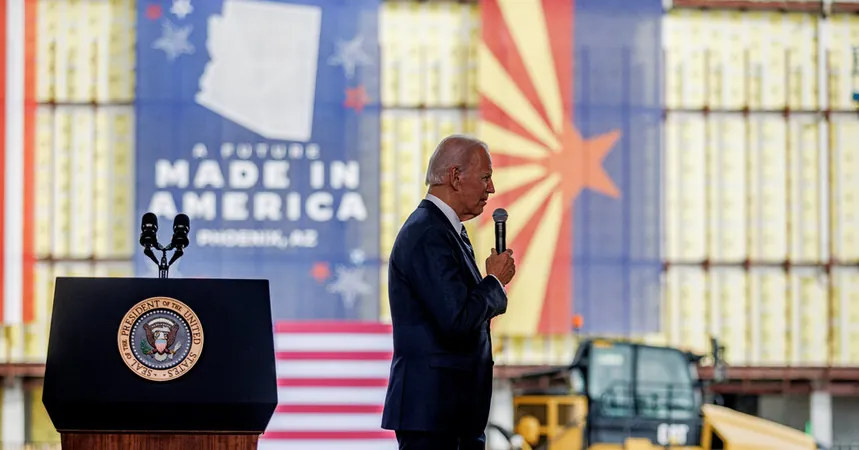
Biden’s $6.6 Billion TSMC Grant: A Race Against Time Before Trump’s Return
2024-11-15
Author: Jessica Wong
In a significant move to bolster U.S. semiconductor manufacturing, the Biden administration has finalized a groundbreaking agreement to provide Taiwan Semiconductor Manufacturing Company (TSMC) with up to $6.6 billion in grants. This decision aims to pave the way for the construction of three new advanced chip factories in Phoenix, Arizona, as federal officials scramble to enhance domestic chip production before the potential end of Biden's presidential term.
This monumental arrangement marks the largest foreign direct investment for a new factory project in U.S. history, with Biden hailing it as a critical step in his administration's ambition to revitalize American technology manufacturing. “This agreement demonstrates how we are ensuring that the progress made to date will continue to unfold in the coming years, benefiting communities all across the country,” Biden stated.
The funding will be doled out in tranches as TSMC hits specific project milestones, but there’s a ticking clock: many of these chip factories may not commence operations until well into Donald J. Trump’s potential presidency. The urgency behind these grants underscores a broader strategy by the Biden administration to solidify its legacy in an era of emerging technologies, particularly as the country seeks to reduce its reliance on foreign semiconductor sources.
The grant agreement is part of a much larger $39 billion initiative under the 2022 CHIPS and Science Act, which aims to combat the decades-long trend of offshoring in the tech industry. It’s worth noting that currently, only about 10% of the world's semiconductors are produced in the United States, a steep decline from 37% in 1990.
While the Biden administration has touted several funding deals as successes, critics point out that no funds have yet been disbursed, raising concerns that Trump could claim credit for the related job creation and economic benefits once the projects kick off. TSMC, notably, stands as the second company to secure grants, following Polar Semiconductor, despite many industry executives expressing frustration over the pace of funding distribution.
The administration remains optimistic, particularly highlighting TSMC's investment of over $65 billion in its Arizona facilities, which are designed to manufacture advanced chips crucial for technologies driving artificial intelligence and high-tech military applications. “When we started implementing the CHIPS program, many said it wasn’t possible,” Commerce Secretary Gina M. Raimondo declared, emphasizing the significance of having TSMC bring its advanced technology to U.S. soil.
However, Trump has been critical of this approach, previously expressing that the CHIPS program disproportionately benefits wealthy companies and suggesting that high tariffs on foreign chips would be more effective in motivating domestic production. Ironically, during his first term, Trump's administration sought to attract TSMC to America, reflecting a shift in strategy.
As the Biden administration looks to solidify its achievements before the end of its term, the race is on to establish a robust semiconductor manufacturing base in the U.S., potentially setting the stage for an intriguing battle of narratives should Trump return to power. Can Biden’s plans take root, or will they become a talking point for his successor? Only time will reveal the outcome in this high-stakes technological turf war.

 Brasil (PT)
Brasil (PT)
 Canada (EN)
Canada (EN)
 Chile (ES)
Chile (ES)
 España (ES)
España (ES)
 France (FR)
France (FR)
 Hong Kong (EN)
Hong Kong (EN)
 Italia (IT)
Italia (IT)
 日本 (JA)
日本 (JA)
 Magyarország (HU)
Magyarország (HU)
 Norge (NO)
Norge (NO)
 Polska (PL)
Polska (PL)
 Schweiz (DE)
Schweiz (DE)
 Singapore (EN)
Singapore (EN)
 Sverige (SV)
Sverige (SV)
 Suomi (FI)
Suomi (FI)
 Türkiye (TR)
Türkiye (TR)